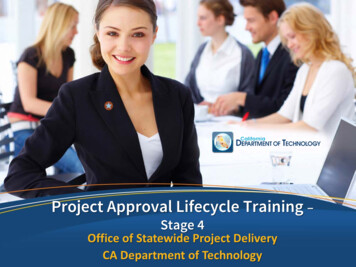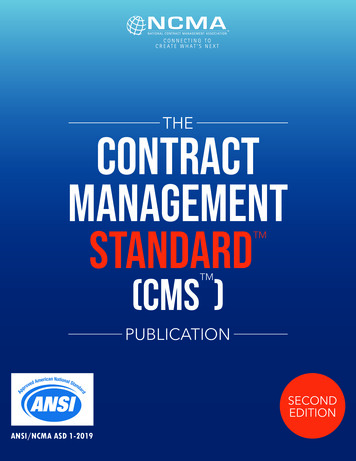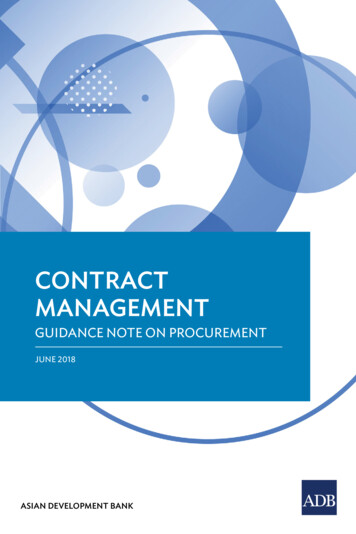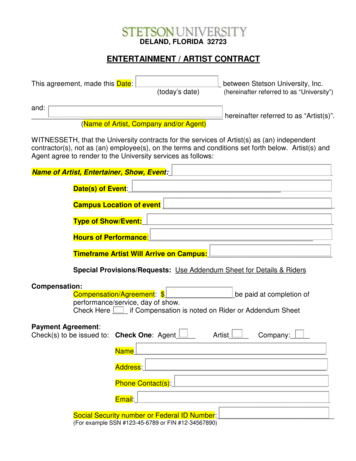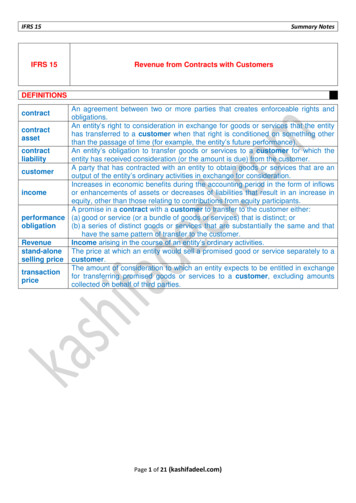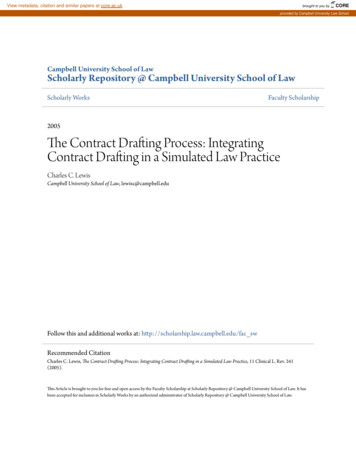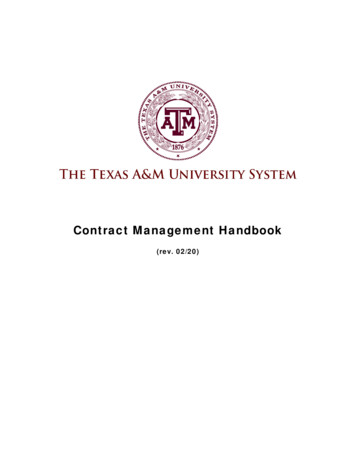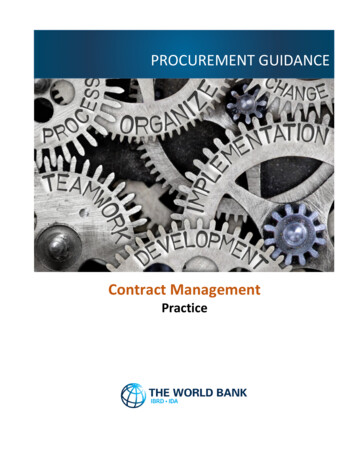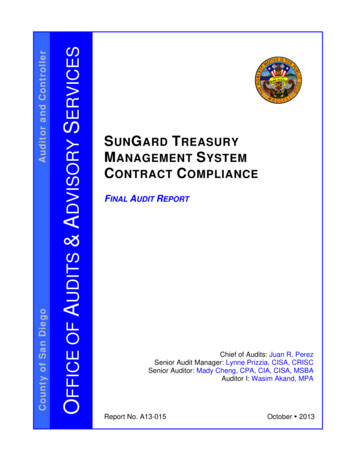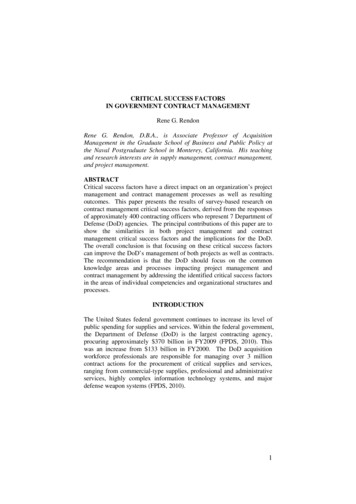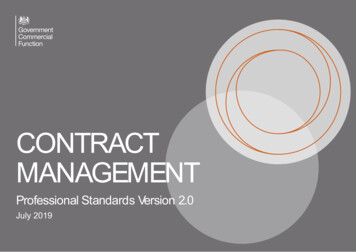
Transcription
CONTRACTMANAGEMENTProfessional Standards Version 2.0July 2019
How do I use this document?The Standards will help you reflect on your (or your team’s) capabilities and development needs, and can beused as a tool for career progression and to inform development conversations. They can be used to identifydevelopment needs or technical areas of interest, which you can address by building your capabilities throughtargeted learning and development interventions.The Standards have been designed to be read alongside the Success Profiles - Civil Service Behaviours, CivilService Leadership Statement and the Civil Service Code. They are not a detailed handbook of all contractmanagement activities. The Cross Government Contract Management Best Practice Guide and its supportingtemplates should be referred to for this purpose.If the content of this document applies to you directly, you are encouraged sign up to the Contract Managementtraining, which explains how to embed these principles into your day-to-day responsibilities. The training isbased on these Standards and is available at the defined three levels; Foundation, Practitioner and Expert.Please contact your organisation or the Contract Management team for more information on how to get involved.Development of the StandardsContent is under continuous development and therefore new versions of the Standards may be uploadedperiodically. Version 2 has been updated in line with the new Contract Management training and assessmentmaterials and includes more references to the role of the Senior Business Owner, refreshed People Profiles andinformation on example career pathways.For further information or to provide feedback please contact the Contract Management team via contractmanagement@cabinetoffice.gov.uk.2
CONTENTSForeword1Introduction2People Profiles9Case Studies14Section A: Acumen, Relationships and Leadership17Section B: Technical Expertise20Annexes27
FOREWORDJohn ManzoniChief Executive of the Civil Service andCabinet Office Permanent SecretarySuccessful contract management matters inreal life: it leads to a child attending a goodschool, equipped with essential facilitiesrequired for them to succeed; it means anelderly person getting the medicine, supportand assistance needed to live a long andhappy life; it enables well-maintainedmotorways to get us safely from A to B.Every year central government spends 49billion through contracts on vital goods andpublic services. It is essential that we havethe capability within the public sector tounderstand the policy goal or operationalobjective; procure services if necessary;then manage these contracts effectively.The ability to successfully procure theseservices is a critical skill. However, if we onlyfocus on this aspect, we can riskunderestimating the impact of otherimportant elements of contract managementsuch as managing contract delivery, changecontrol, stakeholder management andultimately the close-down of one contractand the design of the next. These elementscan make the difference between thesuccess and failure of vital services andmajor infrastructure projects.the commercial function. Individualsresponsible for these activities are oftenanchored in project management,operations and other professions. TheContract Management ProfessionalStandards have been developed to ensureconsistency across the landscape and setclear capability benchmarks for individualsinvolved.Whether you identify as a contract manageror carry out contract management activitiesas part of a wider role, we want to help youdevelop the full range of skills, acumen andrelationships required to manage contractseffectively. The standards can help identifydevelopment needs and learningopportunities. They also form the basis forthe assessment for individuals aiming foraccreditation.When we spend money well, we canachieve great things. Successful servicescan not only change lives, but also impacton the prosperity and security of the UK. Ascivil and public servants we all have a dutyto deliver the best results for the taxpayer.We are entrusted with enormous amounts ofpublic money and it is our responsibility tospend it well, for the benefit of our citizens.We have recognised that the majority ofcontract management activity sits outside of1
INTRODUCTION2
What are the ContractManagement ProfessionalStandards?The Standards set out the capabilitiesexpected of government professionals whoare involved in the management of contracts.Who are they for?These Standards are for individuals whoidentify as contract managers as well asthose within an operational delivery, policy orother roles who: Contribute to or make decisions thataffect the obligations of a supplier orhave other commercial impacts; Carry out contract managementactivities as part of their role; and/or Take part in supplier interactionsor negotiations.In using third party suppliers, governmentremains accountable for service delivery,delivering benefits and managing theassociated risks. Successful management ofthese contracts and suppliers depends onthese individuals forming cross-functionalrelationships with colleagues from multipledisciplines to develop a balanced view ofrisks and opportunities, as well as obtainprofessional expertise on specific issues.The diagram below illustrates this crossfunctional way of working. While the areasshown are some of the most frequentlyobserved in terms of input and engagement,this is one picture among many; the extent towhich they are required will vary accordingto the nature of the contract and the supplierrelationship, as will the involvement of othergroups including IT, communications andbusiness users.The Standards include case studies whichillustrate the cross functional nature of thework carried out during a contract’slifecycle, as well as high level contractmanagement activities.Operational rcialHRProject Delivery3
Supplier relationships and contract deliveryalso benefit from these relationships beingestablished up front in the commerciallifecycle. Contract management activitiesshould not wait for a contract award to start.Individuals responsible for performing theseactivities should ideally be involved from theoutset to: gather and share lessons learned;confirm the contract is fit for purpose andappropriate resources are in place; inform theprocurement process; and ensure a successfultransition to service delivery (below):The Standards have therefore been developedto support individuals in being more effectivein their roles throughout this process, throughcomprehensively articulating the acumen,relationships and technical skills requiredwhen carrying out contract managementrelated activities.development. They can also provide insightfor individuals who would benefit from furtherunderstanding of this area, such as strategy,policy and commissioning professionals.By providing a level of clarity and consistencyaround roles and responsibilities, theStandards assist with career progressionconversations and are designed to stimulatemeaningful conversations around learning andFor more information on SeniorResponsible Owners (SROs) see AnnexB.For example day-to-day roles at each tierplease see the People Profiles section.Time spend on value-add activitySRO and ContractManager involvementSROs and ContractManagers should beinvolved from the beginningof the contract managementlifecycle to maximise valueand impact.Historic Contract ManagerinvolvementHistorically, the focus whenmanaging contracts startedhere. However, a number ofissues could have alreadyarisen or been agreed priorto this point.Stakeholder, supplier andmarket engagementProcurementContract and supplier management4
How were they developed?Standards apply to these capability levelsThe Standards incorporate best practicefrom across government and relevant insightfrom the private sector.Taking a cross-government approach, theStandards were developed with input fromcommercial and non-commercial colleaguesacross departments as well as professionalbodies, CIPS and IACCM. A number ofpre-existing sources also fed into thedevelopment of the Standards, moreinformation can be found in Annex C.How are they structured?Given the breadth of individuals acrossgovernment involved in different stages ofcontract management, there is a variationin roles and activities within Civil Servicegrades among the community. The ContractManagement Standards are therefore notaligned to Civil Service grades, insteadsetting out minimum requirements at threelevels, Foundation, Practitioner and Expert.Due to the variety of contracts undermanagement across government, the leveland experience required will also beaffected by the size, scale, risk, complexityand criticality of the contract/relationship.The Standards can help departmentsarticulate the attributes and resourceFoundationPractitionerExpertSenior Responsible Owner (SRO)Foundation: Uses understanding of contractmanagement principles to input into successfuldelivery of organisational outcomesExpert: Takes a strategic view, drawingon best practice to lead on achievingorganisational outcomesPractitioner: Applies knowledge and skill todeliver effectively on responsibilities to achieveorganisational outcomesSRO: Ensures there is sufficient, accredited,contract management resource and testscontract management recommendationsquantity required according to the tiers tosupport successful contract delivery.Links between levelsIn a typical large project, the SRO will rely on awell-organised contract management team todeliver the required services through thecontractor(s). This team will typically be managedby an expert who will anticipate and act on a widerange of strategic issues, delivery risks and seniorstakeholder concerns. They will be supported byone or more practitioners who will focus on oneor more contractors in the supply chain and/orparticular aspects of the service. Foundation levelstaff may be directly supporting practitioners ormanaging a small contract as part of a broaderrole.Further detail on how the Standards relate to the NAO Commercial and contract management: insights and emerging best practice document and the Cross-Government ContractManagement Working Group Best Practice Guide, can be found in Annex A.5
Career Pathways and ContractManagementMost Contract Managers will have their career anchor in aparticular profession, such as one in the diagram below.Becoming accredited at the different contract managementlevels can provide skills required for promotion and differentopportunities, whilst retaining your identity as part of thatprofession.Many of these professions have their own career paths and/orpeople standards on gov.uk that can be referred to for moreinformation.Example Career Pathway for aContract Manager in Operational DeliverySenior ContractManager(For a frontline service)Contract Manager(For a frontline service)Responsible for ensuring medium-scale contracts deliver theexpected goods, services and outcomes including activitiessuch as; contract variations, risk management approach, leadingday to day interactions with suppliers and managing KPIs.Relevant accreditation: PractitionerContract Analyst(For a frontline service)Responsible for supporting the management of contractsincluding; reporting on performance information, drafting andfiling contract documentation and recording lessons learned.Relevant accreditation: FoundationOperational rcialResponsible for the most significant and complex contracts,taking a strategic approach to understand the organisationalobjectives and providing leadership and expertise to their team.Relevant accreditation: ExpertExample Career Pathway for aContract Manager in HRHead of Recruitment(Pan-government)Responsible for understanding cross-departmental and crossfunctional requirements, feeding into the procurement processand having overall contract management responsibility acrossthe portfolio of contracts.Relevant accreditation: ExpertHead of Recruitment(In a dept. or function)Responsible for inputting to procurement activity, holdingregular supplier review meetings as well as monitoring spendand performance across a range of contracts.Relevant accreditation: PractitionerRecruitment AccountManager(In a dept. or function)Responsible for commissioning work to suppliers from a preagreed framework, monitoring day to day performance.Relevant accreditation: FoundationHRProject DeliveryContract Management is not currently a profession, though this may be explored in the future.6
What do they include?A. Acumen, Relationships and LeadershipThe Standards are structured into twosections: Section A describes the businessacumen, relationships and leadershipcapability required; and Section Bdescribes technical areas of expertise. Theinterpretation of each capability area willvary by each level, Foundation, Practitionerand Expert.Section A describes the business acumen, relationship development and leadershipskills required of those managing contracts. Further detail on these can be found below:Please refer to the Annex D: Definitions forany terms with which you are not familiar.A1BUSINESS ACUMENThe business understanding and marketawareness required of those involved inmanaging contracts. These includeapplying a risk mind-set and the ability tomanage complexity when makingdecisions.A2RELATIONSHIPS ANDLEADERSHIP CAPABILITYThe resilience, assertiveness and political insightrequired during stakeholder interactions, whilemaintaining the ability to build relationships. This alsoincludes taking steps to improve contract managementcapability.B. Technical expertiseSection B contains six technical capability areas aligned to the contract management activities carried out by those in government.The technical area(s) relevant to you will be dependent on your role and responsibilities. Further detail on these can be found below:B1DESIGN AND ONGOINGDEVELOPMENTB2PROCUREMENT ANDMOBILISATIONSupporting colleagues in the commercial function bycontributing to re-procurement and new sourcingexercises, as well as using information sources andensuring contract governance set up.Inputting into the procurement exercise, the developmentand implementation of effective planning and, oncesourced, mobilising the contract.B4B5CHANGE CONTROLSTAKEHOLDER ENGAGEMENTUnderstanding and being able to work to the contractchange process. This includes understanding the positiveand negative impact of contractual changes.Identifying and managing relationships with a variety ofstakeholders. This includes the adherence to specificprocesses contained within the contract.B3aMANAGING CONTRACT DELIVERYB3bEXIT AND TRANSITIONAppropriate use of performance management levers with theability to realise contractual benefits. Those carrying outthese activities need to be intuitive to arising risks and able todeal with issues when they arise.RISK MANAGEMENTRisk planning, ensuring compliance and monitoringrisks (including strategic and operational risks).7
The activities contained within Section B are grouped by capability area; while some capability areas may appear to refer to a specific stage in thecontract management lifecycle, it is important to note that many of the activities contained within them can take place throughout the life of thecontract. More effort will be required in some areas of the lifecycle than others and there will be different expectations at Foundation, Practitioner andExpert.An indication of how both Sections A and B of the Standards can apply to the contract management lifecycle is shown in the diagram below:A1 BUSINESS ACUMENA2 RELATIONSHIPS AND LEADERSHIP CAPABILITYB1 DESIGN ANDONGOINGDEVELOPMENTB2 PROCUREMENTANDMOBILISATIONB3a MANAGINGCONTRACTDELIVERYB3b EXIT ANDTRANSITIONB4 CHANGE CONTROLB5 STAKEHOLDER ENGAGEMENTB6 RISK MANAGEMENTContract management behavioursContract management lifecycle activitiesContract management enabling activities8
PEOPLE PROFILESOur day to day roles and how the standards apply to us:SROFoundationPractitionerExpertSRO9
Alex GoughService Development ManagerLegal Aid Agency“Monitoringcontractualperformance,to ensureproviders areoperating inaccordancewith theirobligations, isvital in ensuringservice usersreceive qualitylegal services”FoundationMy contract-related activities:How this fits into my team objectives:In my role I am required to have a knowledge of our contractsto understand our suppliers’ contractual obligations. I liaisedirectly with suppliers to answer queries, and work with ourcontract management team to remind suppliers of theirobligations. This forms about 15% of my day-to-day role.My organisation contracts with law firms to provide legal services forthe public. Firms must receive a contract in order to provide legal aidwork in a certain area of law. Monitoring contractual performance, toensure providers are operating in accordance with their obligations, isvital in ensuring service users receive quality legal services and todelivering access to justice.Top 3 activities:1. Day-to-day engagement with suppliers and majorstakeholdersThis requires me to answer contractual queries from suppliersand engage with stakeholders to monitor performance.2. Analysing performance, identifying trends and potentialrisks to deliveryHow the Standards have supported me:I work in the policy profession, and did not see myself as a contractmanager. However, our services are delivered through suppliers on acontractual basis. This means that contract management activities are animportant element of my day-to-day role. The foundation level standardsand training has helped me formalise these elements of my role and gaina greater understanding of contract management principles which I canapply to my day job.I capture and analyse data to assess performance. This allowsme to identify commonly occurring performance issues, which Ithen work with our contract management team to proactivelymanage.3.Drafting contractual provisions to deliver policy changesI work with our legal and contract management teams to draftcontractual provisions in order to deliver policy proposals.10
PractitionerPoppy EldredCommercial Systems AnalystDepartment of Health and Social CareMy contract-related activities:“By maintainingsuch highstandards, wereceive a valuefor moneyplatform thatimproves theefficiency of ourteams”Within the Commercial Directorate of DHSC we have a systemnamed BravoSolution, which we use to map, procure andmanage our contracts. As I am Senior System Administratorfor this platform, I have been asked to become its OperationalContract Manager – thereby ensuring that Bravo - thecompany that provide the system, deliver it to our spec.3.Preparing for contract exit and potential transition.As our contract with Bravo is due to expire in June 2020, with apotential one year extension, I am a member of the projectboard overseeing the re-procurement and potential transition ofthis service. As OCM it will be essential for me to confirm thatall planned actions and mitigating processes are employed, sothat minimal service disruption and user uncertainty occurs.Top 3 activities:1. Monitoring system response times, such as data returnspeed.As OCM I shall chair our monthly service review meeting withthe supplier, where I shall be responsible for ensuring that thesystem reacts to user requests in good time. To do this, I willneed to be familiar with performance reports and be aware ofthe response times that our supplier is contractually committedto.2. Monitoring the supplier’s delivery of systemenhancements.System enhancements are the changes we request to theplatform which affect all users, whether public sector orotherwise. Due to the breadth of their effect, the timescales forimplementation are much larger, which can negatively impactupon internal staff and suppliers. Consequently, it will be myjob to record such requests, liaise with the health family toprioritise them and work closely with Bravo to ensure thatthese are being delivered to a satisfactory standard.How this fits into my team objectives:These activities enable me to ensure that the system that ourprocurement and contract management staff use is responsive,intuitive and flexible. By maintaining such high standards, we receivea value for money platform that improves the efficiency of our teams.Furthermore, my involvement in the re-procurement project board willaid us in onboarding some of the best technology that is affordableand widens our market audience.How the Standards have supported me:Coming from a legal background and having only joined the Commercialteam a year ago, this training has been crucial at providing me with anoverview which complements what I have already learned. It enables meto get the most out of succinct, relevant and highly informative training,whilst also allowing me to meet a diverse range of people from across theCivil Service. I have built a number of networks so far. The training cohortthat I am part of is already exchanging best practice materials. Theworkshops have been challenging but thoroughly enjoyable and havereally increased by ability to speak publicly and understand the broadercommercial picture across government.11
Nick ButlerAssistant Employment Account DirectorContracted Health and Employment Services DirectorateDepartment for Work and Pensions“This is anessential partof thedepartmentmeeting policyintent and weare the peoplethat ensure ourcontractorsdeliver ontheseobjectives”ExpertMy contract-related activities:3.I am accountable for a portfolio of contracts which provideback-to-work support to people who are unemployed. Thissupport is provided through national programmes, for examplethe Work and Health Programme and services are typicallydelivered through a matrix of regional contracts with the privatesector. I lead a team of approximately 50 performancemanagers based all across the country who drive performanceand manage the delivery of the contracts.An important part of my role is ensuring lessons learnedthrough contract management are taken into account indesigning, commissioning, and procuring future programmes.I represent Contract Management on Programme andCommercial Boards for programmes in development and workwith colleagues across Strategy, Policy and Commercial toinfluence design and procurement.Top 3 activities:1. Addressing underperformance with contractorsInfluencing future commissioningHow this fits into my team objectives:I act as an escalation point where contractor performance isunsatisfactory and regional performance management actionhas not yet led to the required improvement. I hold seniorperformance reviews with the contractor, typically at CEO orCOO level, to increase the pressure on the organisation tomeet the department’s requirements.As a team we are responsible for the effective delivery of thecontracted employment support; support that is designed to helppeople move into lasting work, often transforming their and theirfamilies’ lives. This means holding contractors to account, so theyprovide the best service and outcomes for citizens, and we spend theright money to deliver the best value for money for the taxpayer. Thisis an essential part of the department meeting policy intent and we arethe people that ensure our contractors deliver on these objectives.2. Setting contract management strategy and buildingcapability across the divisionHow the Standards have supported me:I am responsible for setting the overall strategy for contractmanagement across the portfolio, making prioritisationdecisions, and ensuring the team has the skills and capabilityto manage the contracts. This includes considering how wemight roll out contract management training across our teams!The standards have supported me to professionalise our approach tocontract and performance management, learning from the best practiceacross government. As a team already devoted to contract managementthis has been an evolution rather than a revolution, and the standards havehelp me hone our approaches. We have recently undertaken a review ofour Performance Management Intervention Regime which sets out theprinciples our people adhere to in addressing underperformance, and thestandards were a valuable input into that review.12
SROMichael CharltonDirector of InvestmentDepartment for International TradeMy contract-related activities:As Director of Investment I am the SRO for a number of highprofile projects and teams. These include: “Cohesiveworking acrossthe network iskey to strongoutputs” The Government to Government (G2G) with Peru to deliverthe PanAmerican Games.The Global Investment Summit, which brings together topexecutives from some of the world’s largest companies inorder to showcase what the UK has to offer and to promoteinvestment.The Investment Services Team, a contract with EY/OCO tosupport foreign direct investment into the UK.Top 3 activities:1. Ensuring each of these contracts are properly managedand fully support policy objectivesThis includes reviewing the organisation of contractmanagement resources, ensuring management informationprovides necessary insight for myself and senior stakeholdersand supporting the contract management team when strategicand relationship issues arise within the contractors and/orclients.3. Ensuring connectivity across the networkI’m responsible for ensuring teamwork across DIT and IST, DITand the Peruvian Government, DIT and Whitehall (particularlyNo.10 and the Foreign and Commonwealth Office). I alsoensure cohesion across the UK network (LEPS, DAs, etc.), andacross the global network (overseas posts).How this fits into my team objectives:The end goal is to promote the UK for foreign investment and toensure the UK remains competitive. This requires a lot of contact withtop investors to ensure the environment remains enticing for them andensuring that operations are reflecting and acting on the key prioritiesof the department. Cohesive working across the network is key tostrong outputs.SRO standardsProfessional Standards specifically for SROs are currently underdevelopment which will form the basis for the subsequent SROtraining offer.2. Client engagementThis includes meeting with top executives and companies todiscuss their operations in relation to the UK. We discuss whatimprovements can be made and how can we help. I regularlyconsider whether we have the appropriate contract andorganisational arrangements in place to meet the needs of UKcompanies.13
CASE STUDIES14
CASE STUDY 1Healthy Start Vitamins contract, Department of Health and Social CareUnder the statutory Healthy Start Scheme, the Department of Health and Social Care procured a five year framework agreement with a value of 2.5m for the manufacture ofchildren’s vitamins for low income families with children under the age of four (who are in receipt of certain benefits). Vitamins are purchased by local public sectororganisations that reclaim the cost from the Department of Health and Social Care. The ordering, supply and reimbursement arrangements are complex, with multidisciplinarysupport required to ensure that the scheme is maintained in line with statutory obligations.The Department of Health and Social Care Contract Management Team carry out an assurance and capability building function. A selection of key contract managementactivities are carried out by the team, as well as the cross functional interactions at each contract lifecycle stage, which are set out below.Stakeholder, supplier and marketengagement stageThe Healthy Start Vitamins Policy Lead established aVirtual Procurement Team that convened weekly toplan and execute the procurement of Healthy StartVitamins. The team included members fromComplex Procurement, the Contract ManagementTeam, Government Legal Department and NHSBusiness Services Authority (the Department’sappointed Contract Managers for the Healthy StartScheme), with specialist advice periodically providedby the Department’s Lead Pharmacist and externallyappointed subject matter experts.The Department of Health and Social Care willmake the vitamins available through its appointedstorage and distribution provider and invoicesand payments will be handled through atransaction processing provider. To mitigate therisks of providing the service via multiplesuppliers, the Virtual Procurement Team exploredthe division of roles and responsibilities betweenthe suppliers, contractual mechanisms tofacilitate their cooperation and the implicationsfor the end customer. Two market engagementevents were also held with potential suppliers toscope out the specification for the products.Procurement stageContract and supplier management stageThis stage was led by the policy lead. TheContract Management Team conductedan iterative review of the procurementdocumentation, focusing on the contractmanagement requirements in the terms andconditions, specification and tender evaluationquestions, making recommendations tostrengthen them where appropriate.A formal handover meeting was conducted betweenComplex Procurement, the Contract Management Teamand the NHS Business Services Authority, the appointedcontract managers.The Virtual Procurement Team maintaineda risk and issue register from the outset ofthe process and in advance of issuing theInvitation to Tender, the Contract ManagementTeam participated in a formal risk workshop toconsider the risks associated with programmeand ensure bidders’ documentation wasamended accordingly.Tender evaluation was mainly conducted byNHS Business Services Authority and Policycolleagues. The Contract ManagementTeam evaluated responses on the contractmanagement elements of the tenderquestionnaire and participated in the moderationmeeting.The Contract Management Team and ComplexProcurement completed the Classification and RiskTool, which categorises each contract into Gold, Silveror Bronze. The t
contract management resource and tests contract management recommendations Foundation:Uses understanding of contract management principles toinput into successful delivery of organisational outcomes Practitioner:Applies knowledge and skill to deliver effective

